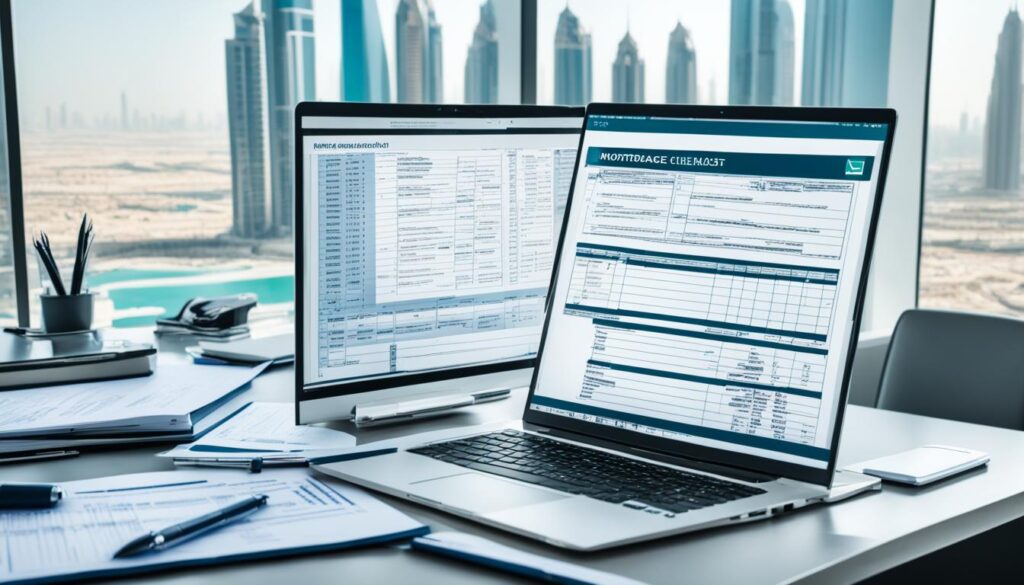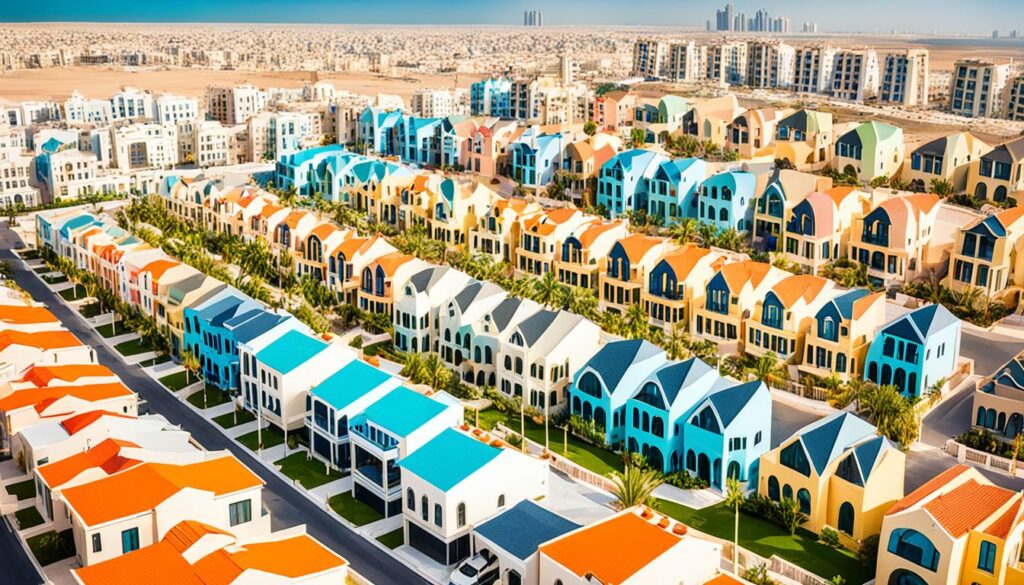Embarking on the journey of financing property in Dubai unveils a realm of opportunities for the expat keen to invest in the bustling heart of the UAE. With the right guidance, understanding the nuances of expat property financing becomes less daunting and more of a strategic move towards securing your piece of the city’s modern landscape. Navigating through the myriad of mortgage options in Dubai can lead one to attractive rates starting at 2.75% on a one-year fixed rate1, and a profound grasp of crucial elements such as down payment requirements and loan caps is essential for successful Dubai real estate funding.
Key Takeaways
- Discover the starting rates for mortgages and the varying terms available to property investors1.
- Learn the deposit expectations for expats, which plays a pivotal role in the financing process1.
- Understand the income and repayment stipulations that safeguard your monthly financial health1.
- Grasp the necessity and implications of buildings insurance when taking out a mortgage1.
- Explore the standard practice of repayment mortgages and how they structure your long-term financial planning1.
Understanding the Dubai Property Market for Expats
The Dubai property market is a fertile ground for expats looking to invest, offering a multitude of investment opportunities that cater to diverse preferences and budgets. With mortgage rates starting as low as 2.75% for a one-year fixed rate, the lure of securing a piece of this vibrant cityscape is as appealing as ever1.
For those considering property investment in Dubai, understanding the financial nuances can make a substantial difference. Expats must prepare for a deposit of at least 25% for properties up to AED 5 million and at least 35% for the more extravagant homes1. This upfront cost is reasonably aligned with the global real estate market standards and ensures a commitment to the investment.
Buy-to-let mortgages represent another avenue in the real estate market in Dubai, though they require a steeper down payment of around 40-50%, reflecting the investment’s lucrative potential1. Expats, perceived as riskier borrowers by some lenders, typically require higher earnings than local applicants when applying for a mortgage in Dubai, a testament to the rigorous standards imposed by financial institutions1.
Dubai’s real estate framework is structured to provide clarity and security for investors, with a mortgage cap set at 50% of the buyer’s monthly income, offering more flexibility than many European countries1. The market boasts over 30 lenders, although options for expats and non-residents can be limited, making thorough research and due diligence essential1.
Timing is crucial, and the processing time for mortgage applications in Dubai usually spans a few weeks, allowing expats to swiftly maneuver through the investment process1. Additional fees, such as a 0.25% loan registration fee, and mandatory buildings insurance are part of the cost of entry when financing a property, ensuring that all aspects of the investment are protected and regulated1.
When it comes to home loans, repayment mortgages are prevalent, although interest-only mortgages can be found, often with terms up to five years. With banks vigorously competing for customers by offering discounted fixed periods, particularly to existing mortgage holders, the Dubai property market is both dynamic and accessible1.
Eligibility Criteria for Expats Seeking Mortgages
When considering a move to the bustling metropolis of Dubai, expatriates often find the prospect of owning property an attractive one. Yet, the process of securing a mortgage can be daunting, particularly when navigating the varied expat mortgage eligibility requirements. Awareness of these standards is crucial for a successful transition into the world of Dubai real estate.
Evaluating Your Employment Status and Income Level
For those seeking to fulfill their homeownership dreams in Dubai, it’s important to have a stable employment history, as banks generally require expatriates to demonstrate a minimum employment tenure ranging from six months to one year2. This tenure requirement serves to assure lenders of the applicant’s income stability and capability to meet the financial obligations of a mortgage. Moreover, self-employed individuals face a slightly more rigorous stipulation, with eligibility often contingent upon establishing approximately two years of successful business operation2.
Residence Visa: A Gateway to Mortgage Approval
An expat’s journey towards mortgage approval in Dubai inherently involves acquiring a valid residence visa. This document stands as testament to the legal residency of the individual and is a vital component of the mortgage approval process for expatriates. Consulting with qualified mortgage brokers within the UAE is highly recommended for those in pursuit of a residence visa—and the mortgage it facilitates2.
The Impact of Nationality on Financing Options
Understanding the impact of nationality on property financing is imperative for expatriates. While local Emiratis can access up to 85% financing of the property value, expats typically need to make a more substantial down payment2. For properties priced under AED 5 million, a minimum of 25% down payment is the standard for expatriates, whereas a property that exceeds the AED 5 million threshold will generally require a 35% down payment2. For off-plan properties still under construction, expatriates may be asked to provide an even higher down payment, which can be around 50%2.
The myriad of mortgage options available in Dubai can accommodate diverse financial circumstances and preferences. Expatriates have the flexibility to choose from fixed-rate mortgages, variable-rate mortgages, and even Islamic mortgages (Ijara), depending on their unique financial goals and circumstances2. Nevertheless, regardless of the chosen mortgage type, banks in Dubai will typically require a property valuation to determine its market value as a part of the approval process2.
Finally, it is crucial for expatriates to realize the gravity of understanding the legal and tax implications that accompany property ownership and mortgage financing in Dubai. Thorough research and consideration of these facets can safeguard against unforeseen complications in the pursuit of home ownership2.
| Requirement | Citizen | Expat |
|---|---|---|
| Financing of Property Value | Up to 85% | Up to 75% |
| Down Payment for Under AED 5M | N/A | 25% |
| Down Payment for Over AED 5M | N/A | 35% |
| Off-Plan Property Down Payment | N/A | 50% |
| Employment Tenure | N/A | 6 months to 1 year |
| Self-Employed Track Record | N/A | Approx. 2 years |
By thoroughly understanding expat mortgage eligibility and the mortgage requirements in Dubai, expatriates can confidently navigate their way toward securing a mortgage and ultimately, a piece of this vibrant city2.
Essential Documents Required for Property Financing
Securing a home loan in Dubai demands meticulous attention to mortgage documentation—a decisive factor that can make or break your dream of owning property in this vibrant emirate. Whether you are navigating through the application process for the first time or are a seasoned investor, understanding the property finance paperwork needed is crucial. Here we unfold a comprehensive checklist that ensures no document is overlooked in your journey to property financing.
Initially, banks in Dubai will evaluate your ability to finance a property by reviewing key documents for property financing. This includes personal identification, such as copies of your passport, alongside your UAE residence visa to confirm legal residency. Your financial stability is then assessed through salary certificates and bank statements, making them indispensable records in the application process. For expatriates, this scrutiny is accentuated, as banks may require higher earnings compared to local applicants when applying for a mortgage1.

A cornerstone to property finance is the down payment. Expats are generally required to make a solid initial investment, which is at least 25% for properties worth up to AED 5 million and spikes to 35% for pricier homes1. Surging further, a buy-to-let mortgage necessitates an even heftier down payment, resting around the 40-50% mark1. Clarification of these figures is obligatory and materializes through proof of down payment, often detailed within bank statements or financial letters.
Beyond the down payment, banks may impose additional requirements such as technical assessment fees and site estimations, earmarking the importance of transparency in all financial dealings3. The tenacity of your application is fortified by including loan protection insurance cost estimations, which vary based on the property and loan value, further underpinning your fiscal responsibility4.
Proper preparation prevents poor performance. Ensuring you have all the necessary mortgage documentation in place can significantly simplify the property financing process.
| Document | Description | Relevance to Application |
|---|---|---|
| Passport Copy | Valid photo identification | Confirms identity and nationality |
| UAE Residence Visa | Proof of legal residency | Validates residency status for expats |
| Salary Certificates/Bank Statements | Evidence of financial stability | Assesses affordability and stability |
| Proof of Down Payment | Confirmation of initial property investment | Verifies readiness and capacity to invest in property |
To distill it down, the documents named here act as the building blocks to securing property finance in Dubai, manifesting your readiness and commitment to the responsibilities of homeownership. Aligning this paperwork at an early stage is not just about compliance but expressing your seriousness as an applicant, a sentiment highly regarded by lenders. It must be noted, though, that requirements can evolve, and staying abreast of current trends and regulatory changes remains essential for a successful property financing endeavor.
Financing Property in Dubai: Mortgage Types Explored
As expats navigate the vibrant property landscape of Dubai, understanding the nuances of mortgage types in Dubai becomes essential. With a range of financing options tailored to diverse needs, individuals can choose from fixed-rate mortgage options, variable-rate mortgages, and Islamic mortgages, catering to those seeking Sharia-compliant financing solutions.

Fixed-Rate Mortgages Versus Variable-Rate Mortgages
For those seeking predictability in their repayment schedules, a fixed-rate mortgage offers steady interest rates throughout the term, shielding borrowers from market fluctuations. Conversely, a variable-rate mortgage can provide initial savings with lower interest rates that adjust based on market benchmarks such as LIBOR or EIBOR5, important to note that under UAE law, interest rates may not exceed 12% per annum5.
Islamic Finance: Understanding Sharia-Compliant Mortgages
In alignment with Islamic principles, Sharia-compliant mortgages are structured as joint ownership or lease-to-own agreements. Known as Islamic mortgages, these financing options avoid the payment of interest, instead relying on profit-sharing models. This arrangement calls for a deeper business relationship based on mutual trust, often seen with financing from real estate investment companies5.
Dubai’s real estate ecosystem strictly adheres to regulatory measures, mandating third-party appraisals by lenders5 and enforcing that valuation companies must be duly licensed5. These measures reinforce the trust and transparency within the mortgage marketplace in Dubai.
| Mortgage Type | Advantages | Disadvantages |
|---|---|---|
| Fixed-Rate Mortgage | Stable interest rates; predictable payments | Potentially higher initial rates than variable |
| Variable-Rate Mortgage | Lower initial rates; potential savings with interest caps | Risk of increased rates with market changes |
| Islamic Mortgage | Sharia-compliant; avoids interest | Requires strong business relationships; limited flexibility |
Prospective homeowners must also consider the legal landscape surrounding mortgages in Dubai. For instance, to exercise enforcement of mortgages, lenders must acquire a court order to sell the property via public auction, a process varying by emirate5.
Investment Loans and Financing Options Beyond Mortgages
While traditional mortgages are a common avenue for property financing, potential investors and expatriates in Dubai are increasingly exploring the landscape of investment loans in Dubai and diverse real estate financing options. Not only do these alternative financing methods provide more flexibility, but they also offer opportunities tailored to individual investment strategies and long-term goals.

Seeking Financing from Finance Companies in Dubai
Securing funding through finance companies in Dubai is a significant alternative to standard banking mortgages. These entities specialize in investment loans, often with less stringent requirements than traditional mortgage lenders. By partnering with finance companies, investors can gain access to a variety of loan products catering specifically to the real estate sector.
It’s important to approach investment with caution, as real estate financing options can carry risks. For instance, investors may get back less than they invested, and past performance is not a reliable indicator of future results6. Therefore, thorough research and risk assessment are paramount when considering these financial avenues.
Navigating Real Estate Investment Loans
Real estate investment loans can be complex financial instruments that require careful navigation. It’s essential for investors to understand the terms and conditions, as asset allocation and diversification do not guarantee a profit or protect against loss6. Professional advice tailored to the current market conditions can offer insights into the most suitable loan structures and strategies6.
Furthermore, it’s important to be wary of forward-looking statements, as they should not be considered guarantees or predictions of future events6. Transparency and critical analysis of any computations, graphs, tables, diagrams, or commentary provided in the financing material is crucial, as no representation or warranty should be made with regard to their accuracy6.
| Financing Option | Pros | Cons |
|---|---|---|
| Bank Mortgages | Structured payment plans, fixed interest rates | Stringent eligibility criteria, potential for higher overall costs |
| Investment Loans | Flexible terms, often faster approval process | Possibility of higher risk, variable interest rates |
| Finance Company Loans | Specialized real estate products, tailored services | Potentially less regulated, varied loan terms |
Choosing the right financing path is vital, and expert advice from reputable sources is recommended to navigate the intricacies of investment loans. These insights, coupled with robust financial planning, can help ensure that your investment in Dubai’s real estate market is both sound and prosperous.
The Role of Down Payments in Property Purchases
Understanding the down payment for property in Dubai is crucial for any expat entering the real estate market. Typically, the minimum down payment required for a home loan in Dubai is pegged at 10% of the property’s cost7. This initial investment not only serves to secure the property but also affects the subsequent financial dynamics of the mortgage agreement. Making a substantial down payment can result in preferable mortgage terms, like lower interest rates, which can lead to significant savings over time7.

The impact of a down payment extends beyond just interest rates. Homebuyers who choose larger down payments often benefit from reduced processing costs and insurance premiums, thus diminishing the overall cost associated with the transaction7. Given these financial incentives, individuals, particularly those in their 30s and late 20s, are increasingly inclined to invest in property sooner rather than later—a departure from traditional home-buying trends7.
Despite the temptation to liquidate long-term investments for the sake of a home purchase, financial advisors discourage such actions due to their potential to disrupt financial planning and yield sub-optimal returns7. Instead, a more measured approach like proportionate release payment options offered by some lenders allows down payments to be made in manageable portions throughout the construction period. This strategy aligns the expenditure with the project’s progress7.
Funding a down payment can sometimes necessitate creative financial solutions. Borrowing against life insurance policies or provident funds is an avenue to leverage long-term savings for immediate needs, such as a down payment7. Alternatively, if all other options are exhausted, borrowing from friends or family may be considered, though one must pay careful attention to the implications and terms of repayment to avoid future financial discord7.
In line with mortgage down payment requirements, lenders rigorously apply risk management standards, mandating a prudent Loan-to-Value (LTV) ratio, which ensures that the borrower’s financial interest in the property is maintained8. Alongside this, effective income verification processes and reasonable debt service coverage conditions are employed by mortgage providers to ensure the borrower’s capability to repay the loan without undermining their financial stability8.
To further protect the financial ecosystem, regulations regarding mortgage loans, as updated by Central Bank Board of Directors’ resolutions in 2019 and 2020, firmly position down payments as both an anchor of fiscal responsibility for buyers and a cornerstone of risk mitigation for lenders8. Therefore, navigating the necessities of down payments becomes a journey of balancing immediate capabilities with long-term financial health—a path well worth treading for the dream of property ownership in Dubai.
Navigating Interest Rates and Loan Terms
For expatriates settling in Dubai, understanding the nuances of interest rates in Dubai alongside favorable loan terms in Dubai is the cornerstone of securing a promising real estate investment. This segment aims to elucidate the intricate dynamics of the UAE’s loan environment, providing readers with actionable insights into managing their property financing effectively.
How the UAE Central Bank Influences Interest Rates
The UAE Central Bank plays a pivotal role in tailoring the economic landscape, with its policies directly impacting interest rates in Dubai. Consequently, expatriates seeking to finance their dream home in the emirate could witness varying rates, starting from a one-year fixed rate at 2.75%, scaling up to 3.89% for a three-year term or 3.99% for a five-year agreement1. Furthermore, assessments pertaining to mortgage affordability have been established, capping borrowing at an amount not exceeding an expat’s total anticipated earnings over a seven-year horizon1.
| Loan Term | Interest Rate (Fixed) | Income Cap on Mortgage |
|---|---|---|
| 1 Year | 2.75% | 50% of Monthly Income1 |
| 3 Years | 3.89% | Borrow up to 7 years of anticipated earnings1 |
| 5 Years | 3.99% |
Selecting the Right Lender: Fees, Reputation, and Customer Service
Selecting the most suitable mortgage lenders in Dubai requires a balanced consideration of various factors, including but not limited to fees, reputable stature in the market, and the level of customer service provided. Prospective homeowners should meticulously analyze loan offerings that provide up to 80% of the property’s value with tenures maximally extending up to 25 years9. Moreover, it is advisable to look for lending institutions offering supplementary benefits such as free life and property insurance, absence of application fees, and competitive rates further sweetening the deal9. It is this combination of desirable terms and additional perks that form the basis of a beneficial mortgage experience.
- Maximum Loan Tenure: Up to 25 years9
- Maximum Financing: 80% of property value9
- Free Insurance Options: Life and Property9
- No Application Fee: Reduces upfront costs9
Understanding the financial infrastructure is a crucial step for expatriates in actualizing their property aspirations in Dubai. By appraising the various loan products available and discerning the optimal balance of interest rates, loan terms, and lender credibility, they can effectively navigate the complex tapestry of mortgages in the UAE.
Conclusion
Embarking on the journey of financing property in Dubai requires a nuanced understanding of the vibrant real estate market and a strategic approach to mortgage options. This expat guide to property financing in Dubai serves as a comprehensive property financing guide to arm potential expatriate investors with knowledge, evidenced by the significant growth in average residential prices, which surged by 15.9% in the year through May 202310. Similarly, Dubai’s skilled real estate market showcases its profitability with record-breaking sales and mortgage transactions reaching AED4.76bn ($1.3bn) in a single day10.
Investors looking for optimal returns will find Dubai’s rental yields and the return on investment impressive. Downtown Dubai properties, for instance, offer an average rental yield of 4.9%, surpassing those of many global metropolises10. With expansive opportunities like this, it’s essential not only to understand the financing mechanisms but to also appreciate the potential gains real estate holdings can bring. Securing financial growth is made tangible by locations such as Dubai Marina and Jumeirah Village Circle, which yield returns of 5.80% and 5.94%, respectively10.
As we conclude this guide, remember that a successful property financing journey in Dubai requires diligence and expert navigation. Whether it’s gravitating towards Palm Jumeirah’s alluring 5.30% ROI10 or capitalizing on property price increases, which in some areas are expected to rise up to 8% annually10, the key to unlocking real estate potential lies in informed decision-making and strategic planning. With this knowledge in hand, expatriates are poised to make confident strides in the dynamic landscape of Dubai’s property market.
FAQ
What are the eligibility criteria for expats seeking mortgages in Dubai?
Expats seeking mortgages in Dubai need to consider their employment status, income level, and residence visa. Nationality can also impact financing options.
What documents are required for property financing in Dubai?
Essential documents for property financing in Dubai include passport copies, residence visa, salary certificates, bank statements, and proof of down payment.
What types of mortgages are available to expats in Dubai?
Expats in Dubai can choose between fixed-rate mortgages, variable-rate mortgages, and Sharia-compliant mortgages.
Are there financing options beyond traditional mortgages?
Yes, expats in Dubai can explore investment loans and seek financing from finance companies for their property purchases.
What is the role of down payments in property purchases in Dubai?
Down payments are a financial commitment that expats need to make when purchasing property in Dubai. The minimum down payment requirements are based on the property value.
How can expats navigate interest rates and loan terms in Dubai?
Expats in Dubai need to consider the influence of the UAE Central Bank on interest rates and select the right lender based on fees, reputation, and customer service.
Source Links
- https://www.expatica.com/ae/housing/buying/mortgages-in-the-united-arab-emirates-71492/
- https://medium.com/@hazelwatson599/everything-you-need-to-know-about-mortgages-for-expats-in-dubai-53d1d1daba10
- https://www.dubizzle.com/blog/property/home-loan-uae/
- https://www.select-group.ae/post/how-to-finance-your-property-purchase-in-dubai
- https://www.lexology.com/library/detail.aspx?g=53201f33-46f9-4134-90a1-bd169adbad6c
- https://privatebank.jpmorgan.com/nam/en/services/lending/real-estate-lending
- https://www.hdfc.com/blog/home-finance/tips-making-down-payment-your-home
- https://rulebook.centralbank.ae/en/rulebook/regulations-regarding-mortgage-loans
- https://www.emiratesnbd.com/en/loans/home-loans/loan-against-property-for-expatriates
- https://m.economictimes.com/tech/technology/the-ultimate-guide-to-investment-properties-in-dubai-tips-trends-and-opportunities/articleshow/101392701.cms
Comments